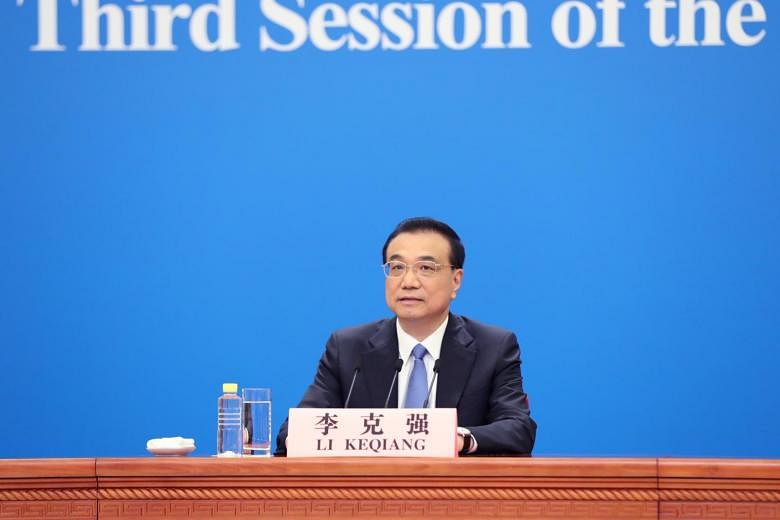BEIJING - China's measures to revive its economy are forceful and targeted, and will support people's lives and livelihoods, Chinese Premier Li Keqiang said on Thursday (May 28) stressing that Beijing will not flood the economy with liquidity.
"Just as water is important to fish farming, sufficient liquidity is important to economic development. But excessive liquidity will induce froth in the marketplace where some people may attempt to muddy the waters and fish for arbitrage," Mr Li said, using a Chinese idiom used to describe people taking advantage of a chaotic time to create confusion for their own benefit.
Premier Li was addressing China's post-Covid-19 recovery at his annual press conference after the closing of China's annual parliamentary meetings, the National People's Congress (NPC).
The economic shock caused by the new coronavirus is unprecedented and calls for creative solutions, Mr Li said.
"I'm afraid we don't have ready experience to draw from. It's not something we can manage with ease," he said.
He pointed out that 70 per cent of the funds in China's stimulus package will go to small and medium-sized enterprises, and spur consumption. The central government will also tighten its belt and cut non-obligatory expenditures by 50 per cent.
"The money saved will be primarily used to support companies and people's basic living needs," he said.
Some economists have said that China's fiscal stimulus package have fallen below expectations and expect Beijing to unveil further measures later this year.
At the opening of the national legislature meeting last week, Mr Li vowed to stabilise employment and bring the economy back on track with a slew of measures.
It is targeting a budget deficit of 3.6 per cent of GDP, past the long-held red line of 3 per cent and above last year's 2.8 per cent.
It will issue special local government bonds worth 3.75 trillion yuan (S$744 billion) for spending on infrastructure and major projects, such as next-generation information networks, as well as 1 trillion yuan in special treasury bonds.
Mr Li has promised a further 500 billion yuan in tax and fee cuts to help prop up businesses, and the creation of more than nine million new urban jobs, compared with last year's target of 11 million.
Beijing for the first time scrapped an economic growth target this year, citing the uncertainties brought on by the coronavirus pandemic.
The country's economy shrank 6.8 per cent in the first quarter of this year, the worst on record.
Before the virus outbreak, economists had expected China to aim for a GDP growth of around 6 per cent. Last year, the economy expanded by 6.1 per cent, within the 6 to 6.5 per cent it had set at the NPC conclave in March 2019.
Mr Li told reporters that the failure to set a GDP growth target did not mean that economic development was unimportant.
"It is simply impossible for the Chinese economy to stay immune to the impact of the novel coronavirus," he said. "This year we decided not to set a specific GDP growth target. It is a decision informed by the realities on the ground."











